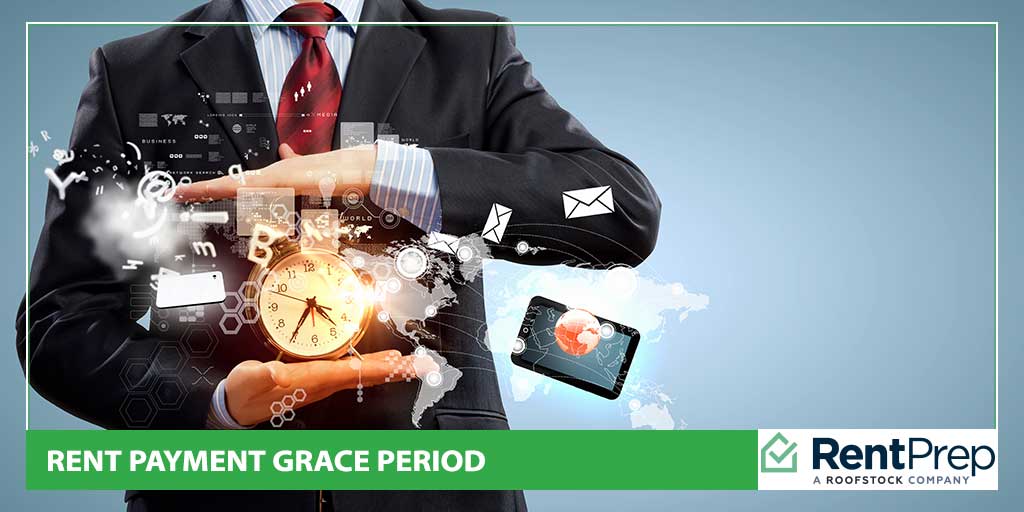
Updated August 2020
Rent grace periods are sometimes a confusing topic for landlords and renters alike. If rent is due on a specific date, why are renters not immediately responsible for covering a late fee from the next day? Why isn’t the rental payment due date changed to simplify the process?
Rental payment grace periods are often built-in to lease agreements so tenants have an opportunity to pay rent on time when something comes up and they accidentally forget. Everyone gets busy sometimes, but it can be confusing since most bills do not have any type of built-in grace period.
Let’s talk more about grace periods, what they do for landlords and tenants, and what you should expect to put into your lease agreements in the future regarding how tenants should go about paying rent on time.
Table Of Contents For Rent Payment Grace Period
- When Is Rent Late?
- What Is A Rent Payment Grace Period?
- How Long Is A Typical Grace Period For Rent?
- Rent Payment Grace Period FAQs
- Our Thoughts On Rent Grace Periods
- Using Grace Periods As A Landlord
When Is Rent Late?

Before we talk about rental grace periods, it’s important to understand when rent is considered to be on-time, when it is late, and how a standard grace period fits between those two things.
Rent that is considered to be late is dependent on two factors:
- What your state laws say
- What your lease states
There are a few states that have specific laws that determine what day of the month rent is due, but if there are no statues at the state level, then this will be purely determined by the lease. In most cases, rent is due on the first of the month. This is the most common date used by landlords when setting up lease agreements.
Some leases will allow a rent grace period (usually of 5 days) of when rent is due.
What Is A Rent Payment Grace Period?
A rent grace period is a period of time after the rent is due where a tenant can still pay the rent without any penalty.
Grace period timeframes can vary state-by-state but are a common issue for landlords with tenants.
Avvo touched on this in their webinar with Zillow addressing grace period concerns.
How Long Is A Typical Grace Period For Rent?

Unless state laws or your lease agreement with your tenants indicate otherwise, there should be no assumption by the tenant that there is a grace period. Grace periods may be mandated by a city or state, or they can be added to the lease agreement by landlords.
In Texas, for example, landlords are not permitted to charge late fees until the tenant is two days past due on rent.
The usual grace period included in a lease agreement is the period outlined by the state where the rental property is located. If there is no mandatory grace period and the landlord wants to add a grace period to the lease, the most commonly used period is five days.
5 Day Grace Period For Rent
This is the most typical grace period used in leases. The transcription below covers this.
Question: Great. Okay. So, one question we received is that I am required to give the five-day grace period for late fee on rent every month. Is rent due on the first or the fifth?
Josh: A part of this is just gonna depend on what’s in your lease. So, your lease may say you’re giving a grace period but, I mean, rent is technically due on the day you say it’s due or you say it’s due in the lease. And, so, what I’ve heard the people should do, if you are having a problem for this because, I mean, hey, if someone gave me a grace period, I would pay it at the last possible date, right? If that’s getting to be a frustration or a problem for you, you should probably just take the grace period out of the lease. And have a provision that if they pay late, that is going to be…that’s going to incur a late fee, or even better yet, that it’s going to incur additional rent.
That’s not necessarily going to solve a problem for you; people may still continue to pay late and not pay you that additional rent, but what it’s probably going to do is discipline the process and not, that for the most part, you’re gonna be getting people to pay on time when you don’t even give them the opportunity of the grace period.
Rent Payment Grace Period FAQs
What Is The Typical Late Fee For Rent?
The standard late rent payment fee for most properties is less than 5% of the rent that was due; most landlords charge between $25 and $50 for late rent payments. Whether you decide to use a flat fee or a percentage based on the cost of rent is up to you, but you must be sure you do not go over any state or local limits on the late fees.
Additionally, remember that you must state what the late fee for late rental payments will be before a tenant is actually late. The late fee that will be charged if a tenant is late must be outlined in the lease agreement.
Can A Landlord Increase Late Fees?
Whether or not you can increase late fees owed by your tenant will depend on your state laws and what is in your lease. In most cases, the final word on this issue will be found in your lease agreement.
Look for these specific points in your lease agreement:
- Does the lease explicitly say what the late fee will be for the lease term?
- Does the lease explicitly give you permission to change fees with notice?
If the lease agreement signed by you and your tenant does not specifically say you can change the late fee without appropriate notice, it is unlikely that you will be able to increase the late fee. Instead, you will need to wait until a new lease agreement is signed to be able to enact an increase unless the tenant is willing to agree to a lease addendum to increase the fee.
Does Late Rent Payment Affect Credit?
There is not a cut-and-dry answer about whether or not late rent payments will affect a tenant’s credit score, and that is because rent payments are not always directly linked to credit reporting agencies.
There are a few ways that rent payment could end up affecting credit scores. Let’s go through those specific situations:
- Positive Impact: On-Time Payments
Some landlords may choose to report on-time payments, which can give renters a positive renting history. - Negative Impact: Late Payments
Landlords who report on-time payments may also choose to report late payments. While rent doesn’t have a direct effect on credit scores at this time, that could change and the rental record would then affect the score. These late payments would also show up in a full credit report. - Negative Impact: Collections
If a tenant owes you a lot of back pay and you ultimately pass the amount due off to a collections agency, the tenant’s credit score would be negatively impacted by the collections filing against them. - Varying Impact: Paying Through Certain Sites
Some online rental payments are connected to credit reporting through Experian or another service. This means that both positive and negative factors, such as when rent is paid, could have an effect on credit score.
Can Apartments Waive Late Fees?
In most places, there are not any rules that would forbid a landlord or property manager from waiving a late fee, but it is not an action we typically recommend for landlords to take.
While waiving late fees can be a kind gesture to a tenant, this simple act can also create unfortunate side effects:
- The tenant may continue to pay late rent without any consequence
- The tenant may become upset if you try to enforce a late fee in the future
- Other tenants who pay late may feel it is unfair if they have to pay a fee
- The terms of your lease may be seen as more flexible than they really are
For those reasons and more, it is best to stick to the terms of your lease in most cases.
Of course, you can choose to make an exception from time-to-time when extraordinary circumstances come about. Landlords have encountered situations where their tenants are suddenly in the hospital or otherwise unable to pay, and making an exception in these very specific circumstances is unlikely to set a negative precedent.
Regardless, make sure you are very careful when determining whether or not you are willing to waive a late fee. Consider future expectations as well as your business’s financial situation.
Is It Bad For Renters To Pay Their Rent Late?
Tenants may ask you why it’s such a big deal if they pay one day late or why they have to pay a late fee for such a small inconvenience. Having not been on your side of the transaction, it is reasonable that they don’t understand.
Paying rent late causes a few ripple effects:
- Creates tension in the landlord-tenant relationship
- Puts the landlord’s finances in a difficult position
- May lead to eviction proceedings if regularly repeated
It is easy for tenants to imagine that all landlords have huge financial holdings, but that is not the case for most landlords who are growing their businesses. Rental payments often go directly towards mortgage payments, so receiving late rent payments can put you under serious financial strain.
What Happens When A Tenant Is Late On Rent?
When a tenant pays late rent, they are going to want to know what happens next. As a landlord, it can benefit you to make it very clear to tenants what the proceedings are going to look like as you move forward.
- Tenant Is Late; Grace Period In Effect
The landlord should contact the tenant with a reminder about rent; let the tenant know when a late fee will be charged. - Tenant is Late; Grace Period Is Over Or Not Applicable
The landlord should contact the tenant and let them know what fee has been incurred; connect with the tenant about what is going on. - Tenant Still Has Not Paid
The landlord can choose to send a notice to pay or quit, which is the first step of the eviction process. - Tenant Does Not Pay After Receiving Notice
You may file for eviction once the required amount of time after notice has passed if rent is still not paid.
Exactly how quickly you move through these steps is up to you as the landlord. No matter how you proceed, notifying tenants when they are late is key. We recommend being consistent and moving with vigor when collecting late rent.
The longer you wait to pursue rent collection, the less likely it is that you will be able to collect what you are owed.
Our Thoughts On Rent Grace Periods
The relationship you have with your tenant (or people in general) is going to be built upon past experiences and the resulting expectations.
If your tenant has been maxing out the grace period duration, it’s going to be difficult to change their expectations on when rent is due.
That’s why your initial standards and communications with a new tenant are so important. Here in New York, the grace period is 5 days.
I had a tenant who sincerely thought the rent was due on the 5th because of how it was written in the lease. It wasn’t the tenant’s fault but my own fault for not clearly communicating when rent was due. After explaining when rent was due, the tenant started paying on the first.
My very first tenant was an actual problem with paying late because I did not have a late fee in place. Once I started charging $5 a day (after the 5 day grace period in NYS), I started getting the rent on the 5th.
Ideally, you want to be able to avoid any grace period talks because your tenant always pays on time.
Using Grace Periods As A Landlord
Grace periods are a way to encourage tenants to pay rent even after life gets in the way, but they are not a free pass to skip paying for rent on time every single month.
Proper tenant screening, clear communication, and charging late fees are all ways to ensure a tenant isn’t taking advantage of the grace period afforded them in your state.
By ensuring your lease agreement contains clear information about grace periods, rental due dates, and rental late fees, you and your tenant will be on the same page about these issues. That is essential so you can effectively enforce the lease terms as needed.

